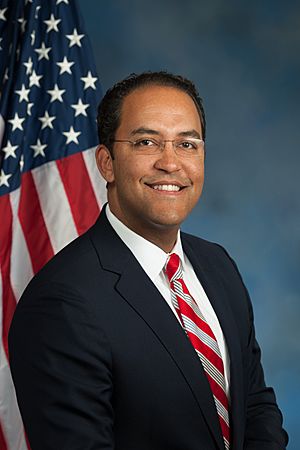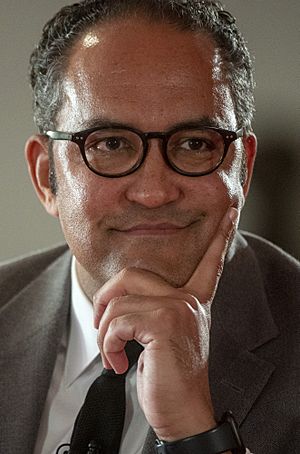Will Hurd facts for kids
Quick facts for kids
Will Hurd
|
|
|---|---|
 |
|
| Member of the U.S. House of Representatives from Texas's 23rd district |
|
| In office January 3, 2015 – January 3, 2021 |
|
| Preceded by | Pete Gallego |
| Succeeded by | Tony Gonzales |
| Personal details | |
| Born |
William Ballard Hurd
August 19, 1977 San Antonio, Texas, U.S. |
| Political party | Republican |
| Spouse |
Lynlie Wallace
(m. 2022) |
| Education | Texas A&M University (BS) |
William Ballard Hurd (born August 19, 1977) is an American politician. He used to work as a secret agent for the CIA. Later, he became a U.S. Representative for a part of Texas. He served in Congress from 2015 to 2021.
After working for the CIA for nine years, Hurd decided to run for Congress. He first tried in 2010 but didn't win. He ran again in 2014 and was successful. His district was very long, stretching from San Antonio to El Paso along the U.S.-Mexican border. He won re-election in 2016 and 2018. However, he chose not to run again in 2020.
In June 2023, Hurd announced he wanted to become president of the United States. He was seeking the Republican nomination for the 2024 election. He stopped his campaign in October 2023 and supported another candidate, Nikki Haley.
Early Life and Education
Will Hurd was born in San Antonio, Texas, on August 19, 1977. His parents are Mary Alice and Robert Hurd. He has a brother named Chuck and a sister named Elizabeth. His father is black, and his mother is white.
Hurd went to John Marshall High School in Leon Valley, Texas. After high school, he attended Texas A&M University. While there, he was elected president of the student body. He was the student body president during a sad event, the 1999 Aggie Bonfire collapse. He studied computer science and also learned about international relations.
Working for the CIA
Hurd worked for the Central Intelligence Agency (CIA) for nine years. This was from 2000 to 2009. He was mostly based in Washington, D.C.. But he also worked as an operations officer in other countries. These included Afghanistan, Pakistan, and India. He can speak Urdu, which is a main language in Pakistan. He worked undercover there.
One of his jobs at the CIA was to give important information to members of Congress. This experience made him want to get involved in politics himself. After leaving the CIA, he returned to Texas. He worked for companies that gave advice on business and cybersecurity.
Serving in the U.S. House of Representatives
Elections
Running for Congress in 2010
In 2009, Hurd decided to run for Congress. He wanted to represent Texas's 23rd district. This district had many Hispanic voters. He had about $70,000 to start his campaign.
A newspaper in San Antonio supported Hurd in 2010. In the first election, he got the most votes. But he didn't get more than half, so there was a second election. Hurd ran against Francisco "Quico" Canseco. Canseco won this second election. Canseco then won the main election. However, Canseco lost his seat in 2012 to Pete Gallego.
Running for Congress in 2014
Hurd ran for the 23rd district again in 2014. He won the first election against Canseco. In the main election, Hurd beat Pete Gallego. This meant that for the third time in a row, the person holding the seat lost. The San Antonio Express-News newspaper supported Hurd again. Many people were surprised by his win.
Former CIA director Robert Gates also supported Hurd. Gates admired Hurd's work at the CIA. He said Hurd had "the character and the integrity and the leadership skills for higher office."
Running for Congress in 2016
Hurd ran for his second term in 2016. He won the Republican primary election easily. His opponent was Pete Gallego again. This election was expected to be very close.
Hurd spoke out against Donald Trump, who was running for president. He didn't like Trump's comments about Muslims and Latinos. He also disagreed with Trump's idea to build a large wall on the border. Hurd called the wall "the most expensive, least effective way to do border security." He said he didn't need to support Trump to win.
Hurd won the election against Gallego. It was a very close race. He did well in some counties, which helped him win.
Running for Congress in 2018
In March 2018, Hurd won the Republican primary again. He got 80% of the votes. The election was against Gina Ortiz Jones. She was a former Air Force intelligence officer.
This election became one of the most expensive congressional races in Texas. It was also one of the closest races in the country. Hurd was officially declared the winner by a small number of votes.
Time in Office
Hurd started his job as a U.S. Representative on January 3, 2015. In his first term, he was one of the new members who passed the most bills. Much of his work focused on technology and cybersecurity. He was known as a leader on technology issues in Congress.
In 2015, Hurd became a co-chair of the Congressional Future Caucus. This group works on future challenges. He also became the chairman of a special committee. This committee focused on information technology and cybersecurity. This was unusual for someone in their first term.
Hurd was also the vice-chair of a committee that dealt with border security. For his second term, he joined the House Permanent Select Committee on Intelligence. His past as a secret agent made him a unique member of Congress.
Hurd was seen as a moderate Republican. This means he often worked with both parties. He voted differently from his party on some issues. These included LGBT rights, gun control, and immigration. He was praised for working with both sides.
In 2019, Hurd was the only black Republican in the House of Representatives. He believed the government should help African Americans help themselves. His district covered a large part of the U.S.-Mexico border. He was the only Republican from a border district in Congress at that time.
On August 1, 2019, Hurd announced he would not run for re-election in 2020.
Groups He Joined
- Congressional Future Caucus (co-chair)
Committees He Served On
- House Committee on Oversight and Government Reform
- Information Technology Subcommittee (chair)
- Homeland Security Committee
- Border and Maritime Subcommittee (vice-chair)
- House Permanent Select Committee on Intelligence
His Political Ideas
Money and Government Spending
In 2019, Hurd was one of a few Republicans who voted with Democrats. They voted to end a government shutdown. This showed he was willing to work across party lines.
Foreign Policy and National Security
Hurd wanted the U.S. military to take more action against ISIS. He believed the Obama administration had not taken the threat seriously enough. He also said that Bashar al-Asad, the leader of Syria, needed to leave power.
Hurd called for better U.S. defenses against cyber-attacks from other countries. He thought federal cybersecurity was not good enough. He also believed that strong encryption on phones helps protect national security.
He did not support the nuclear agreement with Iran. He thought it was dangerous and wanted the U.S. to put more sanctions on Iran. He also spoke out against Russia, calling their government an "adversary."
Hurd supported allowing the U.S. to export crude oil. He also did not support the U.S. becoming friends with Cuba.
Health Care

Hurd wanted to get rid of the Patient Protection and Affordable Care Act, also known as Obamacare. In 2017, when Republicans tried to replace Obamacare, Hurd thought about it carefully. He was worried it would hurt people with existing health problems. He voted against the bill. Many people praised him for this decision.
Immigration
Hurd spoke out against Trump's idea to build a wall on the border. He called it an old-fashioned idea for a modern problem. He said it was the "most expensive and least effective way to secure the border." Instead, he suggested using technology and giving border agents the right tools.
He also criticized Trump's order to stop people from certain Muslim-majority countries from entering the U.S. Hurd said it showed a "display of mistrust."
After Congress
After leaving Congress, Hurd became a visiting scholar at the University of Chicago. He also joined the board of directors for OpenAI, a company that works on artificial intelligence. He later left the OpenAI board to focus on his presidential campaign.
In 2022, Hurd wrote a book called American Reboot: An Idealist's Guide to Getting Big Things Done. The book shared his life story and ideas for the country's future. It received good reviews.
Running for President in 2024
On June 22, 2023, Will Hurd announced he was running for president. He wanted to win the Republican nomination for the 2024 election. He hoped his past election wins and willingness to criticize Donald Trump would make him stand out.
Hurd said he would not support Trump if Trump became the Republican candidate. He believed that the information against Trump showed he knew he was guilty. Hurd also refused to sign a promise to support the final Republican candidate. This promise is usually required to join the primary debates. Hurd said he would not "lie to get access to a microphone."
At a meeting in New Hampshire, Hurd shared his main ideas:
- Supporting U.S. involvement in other countries to protect America.
- Fighting against spying efforts from countries like China and Russia.
- Improving the internet's security to protect Americans online.
- Monitoring AI (Artificial Intelligence) carefully, like nuclear power.
- Reducing government debt by planning budgets better.
- Working with Democrats on important issues.
- Using all types of energy, including renewable, nuclear, and fossil fuels.
- Supporting more gun regulation, like background checks.
- He believed Trump could not beat Joe Biden in the election.
- Supporting American industries, especially in technology.
- Making medicines more affordable.
- Supporting Social Security and private companies.
- Helping more minority voters join the Republican Party.
- Having strict rules for asylum seekers.
- Building a physical or technological barrier on the border.
- Improving mental health services in America.
Hurd also supported creating a "no-fly zone" over Ukraine. He said Ukraine should get all the military help it needs to win the war quickly.
At a Republican event in Iowa, Hurd criticized Donald Trump. He said Trump was "running to stay out of prison." Some people in the audience booed him. Trump called Hurd a "failed former Congressman." Hurd responded by calling Trump a "liar" and a "national security threat."
The New Republic magazine called Hurd the "Last, Best Hope" for Republicans who didn't support Trump. They said he was flexible and met with people to understand their problems.
Hurd did not get enough support to join the first Republican presidential debate. He gave an interview instead. During the interview, he criticized other candidates. He also said he would still support a no-fly zone over Ukraine.
On September 20, 2023, Hurd shared a detailed plan for how he would control AI as president. He suggested creating a new government branch just for AI.
On October 9, 2023, Hurd stopped his campaign for president. He then supported Nikki Haley for the nomination.
Personal Life
In 2017, it was reported that Hurd was dating Lynlie Wallace. She worked for a Texas State Representative. Hurd announced on social media that he and Wallace got married on December 31, 2022.
Hurd lives in Helotes, Texas, which is a town near San Antonio.
See also
 | Shirley Ann Jackson |
 | Garett Morgan |
 | J. Ernest Wilkins Jr. |
 | Elijah McCoy |


